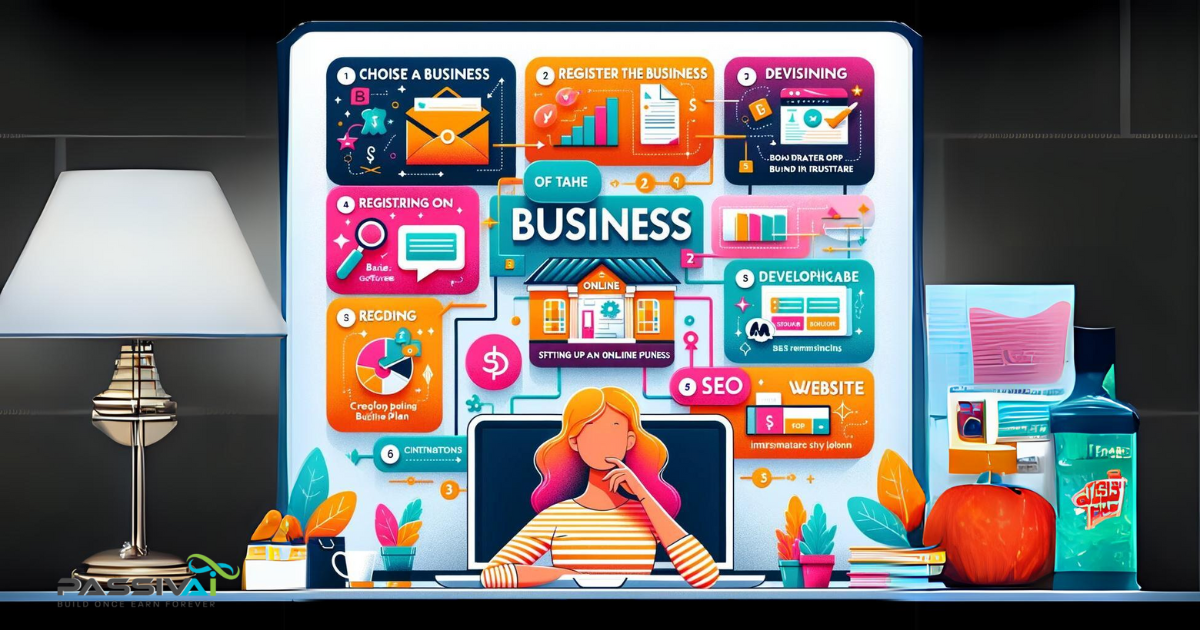How to Make Money From Home Online
YOUR Ideal Passive Income Side Hustle:
A Step-by-Step Guide
 Imagine a world where the conventional grind of 9-to-5 is not the only path to success.
Imagine a world where the conventional grind of 9-to-5 is not the only path to success.The Allure of Making Money from Home
"Can I really make money from home online or is following the well-trodden path a safer choice?"
This question lingered in my mind as I contemplated leaving my regular 9-5 job. Even after my initial venture into the online world stumbled, I found myself pondering the same doubt. Reflecting back, I realize that had I embraced the strategies and insights shared in this comprehensive blog post, I might have been a pioneer in the online dating industry (Yes, you read that right – my first foray into the digital realm was an online dating website, long before the idea became a mainstream thing). I was slightly ahead of the curve then, and now, I’m here to share this wealth of knowledge to ensure you are perfectly timed to seize your online opportunities.

Picture world where your commute is just a few steps from your bed to your desk, where every day is casual Friday, and your office mate is your pet. This isn't a distant dream; it's a reality for millions who have tapped into the online money-making revolution. This guide is your golden ticket to join this thriving concept. We're not just talking about a few extra bucks here and there; we're exploring a path to significant income from your home.
This quite extensive blog post delves into the unexplored territories of how to make money from home online. Let's embark on a journey of thought-provoking ideas, inspiring you to reshape your decision-making process and aligning it with your dreams and family life.
Use the jump menu below to find what you need:
- ~ Understanding the Online Money-Making Landscape: Q&A Guide
- ~ Identifying Your Niche: The First Step to Success
- ~ Setting Up Your Online Business: A Step-by-Step Process
- ~ Harnessing the Power of Digital Marketing
- ~ Monetisation Strategies: Turning Traffic into Revenue
- ~ Scaling Your Business: Growth Tactics for Long-Term Success
- ~ Overcoming Challenges: Staying Motivated and Productive
- ~ What's Next: Taking Your Online Business to New Heights
- ~ Charting Your Digital Course: A Summary of Discovery and Growth
- ~ Elevate Your Online Business with AI: Transform Your Entrepreneurial Journey
Understanding the Online Money-Making Landscape: Q&A Guide
Q: What are the most popular avenues for making money online?
Q: What are the most popular avenues for making money online?
A: The digital world is brimming with opportunities. From freelancing in areas like writing and graphic design to launching your own e-commerce store selling handmade crafts or bespoke products. In fact, according to a recent survey, over 50% of mothers who start a home-based business choose e-commerce due to its flexibility and potential for growth.
Q: How much can I realistically earn from an online side hustle?
Q: How much can I realistically earn from an online side hustle?
A: Earnings vary widely based on your chosen field and commitment. For instance, freelance writers can earn anywhere from £0.05 to £1 per word, depending on their experience and niche. Meanwhile, successful e-commerce stores can generate thousands in revenue each month. The key is to start small and scale up.
Q: What skills are most in demand for online businesses?
Q: What skills are most in demand for online businesses?
A: At the moment, the most sought-after skills are digital marketing, content creation, and web development. Interestingly, about 40% of online entrepreneurs invest in digital marketing courses to boost their business visibility and sales. However, with the rise of AI, businesses are now seeking AI automation specialists and AI Agent experts to deploy everything from admin to social media posts automatically. Check out PassivAi® Infinity Lab Skool if you want to hire one of these experts.
Q: How significant is the role of social media in growing an online business?
Q: How significant is the role of social media in growing an online business?
A: On one hand I would say invaluable as statistics show that businesses using social media marketing experience a 33% increase in customer engagement. Social media isn't just a marketing tool; it's a vital channel for customer interaction and brand building. However, recent stats show that concentrating on one or two channels can significantly increase your funnel conversions. It is also not unheard of for successful entrepreneurs to experience significant wealth creation by only having organic SEO traffic to landing pages that take very niched prospects to a community or group where relationship and trust building starts in earnest.
Q: What are the initial steps to start an online business?
Q: What are the initial steps to start an online business?
A: Start with market research to identify a niche and set up a business plan. You'll need to choose the right platform for your business, whether a website, landing page, community or a social media channel and understand the basics of e-commerce, like payment processing and shipping. Developing a branding strategy that resonates with your target audience is also crucial.
For niche finding that is on another level check out PassivAi® Infinity Lab Skool for free.
Identifying Your Niche: The First Step to Success
The Golden Key to Unlocking Online Success
How do you find the ideal online business niche? Start by asking yourself lots of questions; what you love doing and how it can solve a problem for others. Dive into market research and look at forums, social media trends, and competitors. What are people talking about? What are they looking for?
Here's some great questions to ask:
Q: How do I find the right niche for my online business?
Q: How do I find the right niche for my online business?
A: Finding your niche starts with a blend of personal passion and market demand. Ask yourself, what are you passionate about? What unique skills or knowledge do you have? Then, research if there's a demand for this in the market. For instance, if you're a yoga enthusiast, you might find a niche in selling eco-friendly yoga mats or offering virtual yoga classes. Remember, the more specific your niche, the less competition you'll face.
Q: Is there a foolproof method for validating my business idea?
Q: Is there a foolproof method for validating my business idea?
A: There's no one-size-fits-all method, so conducting market research is crucial. This can include surveys, reviewing social media analytics, keyword research, exploring online forums, and analysing search trends on Google. Your market research is your treasure map to understanding what your audience needs. Don't just look at what's popular; analyse the gaps and opportunities. What are customers complaining about? What needs still need to be met? This understanding will help you tailor your offerings and stand out. For example, if you're considering selling organic baby food, look for trends in sales or parenting forums discussing baby food options. About 70% of successful online businesses spend considerable time on market research before launching.
Q: What are some examples of niche markets that are currently thriving?
Q: What are some examples of niche markets that are currently thriving?
A: Niche markets like sustainable products, home fitness equipment, and personalised children's books are booming. The key is to find a niche that interests you and has a growing customer base. For instance, the market for eco-friendly products is expected to grow by 15% in the next five years, offering a lucrative opportunity for environmentally conscious entrepreneurs. Consider the story of Sarah, who turned her passion for eco-friendly living into a profitable blog and online store. She didn't just sell products; she built a community around sustainable living. Or take John, a fitness enthusiast who developed a unique online coaching program for busy professionals. These success stories underscore the power of a well-chosen niche.
Setting Up Your Online Business: A Step-by-Step Process
 When you start an online business, these steps play a crucial role in establishing a solid foundation for your online success, helping to ensure its long-term growth and scalability.
When you start an online business, these steps play a crucial role in establishing a solid foundation for your online success, helping to ensure its long-term growth and scalability.Step 1. Choosing the Right Platform: Your Digital Foundation
- Select a platform that aligns with your business model (e.g., Shopify for products, WordPress for services).
- Ensure the platform is user-friendly, scalable, and supports various payment methods.
Step 2. Navigating Legal Waters: Business Entities and Regulations
- Decide on a business structure (LTD, LLC, Individual, etc.).
- Register your business and understand your tax obligations.
- Focus on legal compliance to protect your business and personal interests.
Step 3. Branding: More Than Just a Logo
- Develop a brand identity encompassing a name, logo, story, values, and emotions.
- Create a brand that resonates with your audience and fosters loyalty.
- Use your brand to set the tone for all business interactions and communications.
Step 4. Building Your Website: Your Digital Office/Storefront
- Choose the right platform for your website based on your business needs and technical skills.
- Design your website to reflect your brand, ensuring it's user-friendly, mobile-responsive, and visually appealing.
- Include essential features like a home page, about us section, product/service pages, contact information, and a blog.
Step 5. Setting Up E-Commerce Capabilities (if applicable)
- For selling products or services online, integrate an e-commerce system with shopping cart functionality.
- Select and set up payment gateways (like PayPal, Stripe, or Square) to process transactions securely.
- Ensure your website complies with online selling regulations, including data protection and customer privacy.
Step 6. SEO Optimisation: Being Found Online
- Implement basic SEO strategies to improve your website's visibility in search engine results.
- Use relevant keywords, optimise your website's metadata, and create quality content regularly.
- Ensure your website has fast loading speeds and is optimised for mobile devices.
Step 7. Social Media Integration and Marketing
- Set up business accounts on relevant social media platforms to reach your target audience.
- Integrate social media on your website for easy sharing and connectivity.
- Develop a content strategy for your social media channels, focusing on engagement and brand promotion.
Step 8. Launching Your Business
- Prepare a launch plan that includes a marketing and promotional strategy.
- Consider a soft launch to a limited audience for feedback before a full public launch.
- Create buzz around your launch with email marketing, social media campaigns, and influencer collaborations.
Step 9. Analytics and Feedback
- Implement tools like Google Analytics to track your website's performance and user behaviour.
- Regularly review analytics to understand traffic sources, page views, and customer engagement patterns.
- Seek customer feedback through surveys, reviews, and direct communication for continuous improvement.
Step 10. Ongoing Maintenance and Growth
- Keep your website and social media content fresh and up-to-date.
- Regularly update your product/service offerings based on customer demand and feedback.
- Plan for future growth, which may include scaling up your offerings, expanding to new markets, or enhancing your digital presence.
Each of these steps plays a crucial role in establishing a solid foundation for your online business, helping to ensure its long-term success and scalability.
Take the PassivAi® Infinity Lab Niche-Finder Course today -
completely free for Skool members...
Harnessing the Power of Digital Marketing
 At the start of any digital marketing, endeavour, remember your branding: Branding is more than just a logo; it represents your story, values and emotions. Create a brand that resonates with your audience and fosters loyalty and your digital marketing will be as easy as a hot knife through butter.
At the start of any digital marketing, endeavour, remember your branding: Branding is more than just a logo; it represents your story, values and emotions. Create a brand that resonates with your audience and fosters loyalty and your digital marketing will be as easy as a hot knife through butter.Introduction to Digital Marketing Strategies
In the digital era, marketing transcends traditional boundaries, opening up a spectrum of strategies essential for the success of any online business. At the heart of digital marketing are three pillars: SEO (Search Engine Optimisation), content marketing, and social media marketing.
- SEO is about making your website more visible in search engine results. It involves optimising your site with relevant keywords, ensuring fast loading speeds, and producing quality content that aligns with what your audience is searching for.
- Content Marketing: This strategy revolves around creating and distributing valuable, relevant, consistent content to attract and retain a clearly defined audience. The goal is to drive profitable customer action, build trust, and establish authority in your niche.
- Social Media Marketing: It leverages social platforms to connect with your audience, build your brand, increase sales, and drive website traffic. This involves publishing great content on your social media profiles, listening to and engaging your followers, analysing your results, and running social media advertisements.
Creating Compelling Content That Engages and Converts
Engaging content is the cornerstone of digital marketing. Here's how to produce content that not only captures attention but also encourages your audience to take the next step:
- Understand Your Audience: Know who you are writing for. Create buyer personas to understand their needs, desires, and pain points.
- Storytelling: Humans are wired for stories. Use storytelling to make your content relatable and memorable.
- Value and Relevance: Your content should address the problems or needs of your audience. Offer solutions, tips, or insights that are both valuable and relevant.
- Strong Headlines: Your headlines should be captivating, promising readers the answer to their queries or intriguing them enough to read.
- Call-to-Action (CTA): Every piece of content should have a purpose, whether it's to share, subscribe, buy, or contact. Make sure your CTAs are clear and compelling.
Tools and Techniques for Effective Online Marketing
Several tools and techniques can amplify your digital marketing efforts:
- SEO Tools: Tools like SEMrush, Moz, and Google Analytics help in keyword research, tracking the ranking of your website, and gaining insights into your web traffic.
Here's The 10 Best SEO AI Tools
- Frase.io
- Scalenut
- Diib
- Alli AI
- Surfer
- NeuronWriter
- Jasper
- Keyword Insights
- WriterZen
- Aiseo.ai
- Content Management Systems (CMS): Platforms like Solo Build It, WordPress and HubSpot aid in creating, managing, and optimising your content.
- Social Media Tools: Tools like Hootsuite, Buffer, and Sprout Social assist in scheduling posts, analysing social media traffic, and engaging with your audience.
- Email Marketing: Use email marketing platforms like Mailchimp or Constant Contact to directly communicate with your audience, providing personalised content and offers.
By mastering these elements of digital marketing, you can create a powerful online presence that reaches and resonates with your target audience, ultimately driving engagement and conversions. Digital marketing is not a one-time effort but a continuous learning, adapting, and growing process with your audience and the digital landscape.
Monetisation Strategies: Turning Traffic into Revenue
 There are many ways to monetise your online presence effectively.
There are many ways to monetise your online presence effectively.In the bustling online marketplace, attracting visitors to your website or social media platforms is just the beginning. The real challenge—and opportunity—lies in turning this traffic into revenue.
Different Ways to Monetise an Online Business
- Advertising: One of the most straightforward monetisation methods is hosting ads on your website. Platforms like Google AdSense can place relevant ads on your site, earning you money each time a visitor clicks on these ads. Remember, the key is to balance ad placement with user experience.
- Affiliate Marketing: This involves promoting other companies' products and earning a commission for every sale made through your referral. Websites can include affiliate links in blog posts, videos, or social media posts. Affiliate marketing works best when you genuinely endorse products that align with your brand and are valuable to your audience.
- Product Sales: Selling products directly to your consumers is another effective monetisation method. This could be physical goods, digital products, or services. E-commerce platforms like Shopify, WooCommerce, and Etsy can facilitate these sales, providing an end-to-end solution from showcasing products to processing payments.
Tips for Pricing Products/Services and Maximising Profits
- Understand Your Market: Conduct market research to understand what your competitors charge and what your target audience is willing to pay.
- Cost-Plus Pricing: Calculate the total cost of producing your product or service and add a markup percentage for profit. Ensure this price aligns with market expectations.
- Value-Based Pricing: Price your products/services based on the perceived value to the customer rather than just the cost of production. This approach can often lead to higher profit margins.
- Tiered Pricing Models: Offer different pricing tiers for varying levels of product or service features. This caters to a broader audience and allows customers to choose a level that suits their needs and budget.
- Monitor and Adjust: Pricing is not static. Regularly review and adjust your pricing strategy based on market changes, customer feedback, and business goals.
Real-Life Examples of Successful Monetisation Strategies
- Blog Monetisation: Take the example of 'Smart Passive Income' by Pat Flynn, a blog that generates income through affiliate marketing, book sales, and a podcast with sponsored ads. Flynn transparently shares his income reports, showing how diversified income streams can lead to substantial earnings.
- E-Commerce Success: The story of 'Beardbrand', which started as a blog and evolved into an e-commerce site selling beard care products, illustrates the power of understanding your niche market and scaling up.
- Service-Based Monetisation: Marie Forleo's online business courses are a perfect example of monetising expertise. By offering high-value courses, she leverages her knowledge and skills to generate revenue while building a solid personal brand.
In the digital age, the ways to monetise an online presence are only limited by your imagination and willingness to innovate. You can turn your online traffic into a profitable revenue stream by understanding your audience, leveraging your strengths, and continuously adapting to market trends.
Scaling Your Business: Growth Tactics for Long-Term Success
 Online business scalability refers to the ability of an online venture to efficiently maintain quality and performance, embracing automation, outsourcing, and innovation with sustainable growth.
Online business scalability refers to the ability of an online venture to efficiently maintain quality and performance, embracing automation, outsourcing, and innovation with sustainable growth.Expanding your online business is not just about working harder; it's about working smarter. Scaling your business requires strategic planning and execution. Here are key strategies and insights to help you grow your business for long-term success.
Strategies for Scaling Your Business
- Automation: Embrace technology to automate repetitive tasks. Tools like Zapier, Asana, or HubSpot can automate various aspects of marketing, customer service, and operational processes. Automation increases efficiency, reduces errors, and frees up your time to focus on growth-centric activities.
- Outsourcing: Consider outsourcing tasks outside your core competencies as your business grows. Freelance platforms like Upwork or Fiverr can connect you with skilled professionals in graphic design, content creation, or web development. Outsourcing can significantly enhance your productivity and quality of output.
- Expanding Product Lines or Services: Diversify your offerings to cater to a broader audience or to provide more value to existing customers. However, ensure that new products or services align with your brand and meet genuine customer needs.
The Role of Customer Feedback and Continuous Improvement
- Listening to Customers: Customer feedback is invaluable for improvement and innovation. Regularly gather feedback through surveys, reviews, or direct communication.
- Act on Feedback: Use the insights from customer feedback to refine your products, services, and customer experience.
- Continuous Improvement: Adopt a mindset of constant improvement. Stay informed about industry trends and be willing to adapt your strategies and processes accordingly.
Case Studies Showcasing Successful Business Scaling
- Airbnb's Global Expansion: Airbnb scaled from a small room-renting service to a global powerhouse in the hospitality industry. Key to their growth was leveraging technology to streamline the booking process and focusing on user experience to build a loyal customer base.
- Dropbox's Referral Program: Dropbox significantly scaled its user base through a simple yet effective referral program. They incentivised existing users to refer new users by offering additional storage space, demonstrating how understanding customer incentives can lead to rapid growth.
- Slack's Focus on User Experience: Slack's growth strategy centred around creating a seamless user experience and integrating with other business tools and platforms. Their attention to customer needs and feedback helped them expand their market presence rapidly.
Scaling your business is a journey filled with challenges and opportunities. You can strategically guide your company towards sustained growth and success by leveraging automation, outsourcing, expanding your offerings, and listening to your customers. Remember, the goal is not just to grow bigger but to grow better, maintaining the quality and values that made your business successful in the first place.
Overcoming Challenges: Staying Motivated and Productive
 Staying motivated and productive in online business requires resilience, adaptability, and a commitment to continuous self-improvement.
Staying motivated and productive in online business requires resilience, adaptability, and a commitment to continuous self-improvement.Running an online business can be incredibly rewarding, but it's challenging. Understanding these hurdles and navigating them is crucial for maintaining motivation and productivity.
Common Challenges of Running an Online Business
- Time Management: With the flexibility of running an online business, time management can be a significant challenge. Blurring lines between work and personal life leads to overworking or underworking.
- Overcoming Isolation: Working online, especially from home, can be isolating. Without the social interactions of a traditional office, entrepreneurs can feel disconnected.
- Dealing with Technical Issues: Online businesses rely heavily on technology, which means technical glitches can bring your operations to a halt.
- Staying Relevant: The digital landscape is ever-changing. Keeping up with the latest trends and technologies can be overwhelming.
Tips for Maintaining Work-Life Balance and Staying Motivated
- Set Clear Boundaries: Establish specific work hours and stick to them. A dedicated workspace at home can also help mentally separate work from personal life.
- Build a Routine: A consistent daily routine can significantly enhance productivity. Include set times for breaks and exercise to keep your energy levels up.
- Stay Connected: Regularly interact online with peers, mentors, or business groups. Networking events or co-working spaces can also mitigate feelings of isolation.
- Continuous Learning: Dedicate weekly time to learn new skills or about new trends in your industry. This keeps your business strategies fresh and your mind engaged.
- Prioritise Self-Care: Running a business can be stressful. Ensure you're taking care of your physical and mental health. Activities like meditation, exercise, or pursuing a hobby can be incredibly beneficial.
Personal Stories of Resilience and Perseverance

- The Story of Sarah: Sarah started an online crafts business, initially struggling to gain traction. However, she eventually built a loyal and profitable customer base through persistence, learning from customer feedback, and adapting her marketing strategies.
- Mike's Tech Start-up Journey: Mike's journey involved numerous setbacks, including failed partnerships and product launch challenges. His resilience in the face of these obstacles, coupled with a willingness to pivot his business model, eventually led to the success of his tech start-up.
- Anita's Balancing Act: As a mother and entrepreneur, Anita faced the challenge of balancing her online consulting business with family life. She overcame this by setting strict work hours, outsourcing specific tasks, and creating a supportive network.
Every entrepreneur's journey is dotted with challenges, but these obstacles also present opportunities for growth and learning.
Staying motivated and productive in online business requires resilience, adaptability, and a commitment to continuous self-improvement. Remember, every challenge overcome is a step forward in your entrepreneurial journey.
What's Next: Taking Your Online Business to New Heights
 By staying curious, adaptable and open to new possibilities you can take your online business to new heights, tapping into emerging trends and technologies and continuing to find joy and fulfilment in your entrepreneurial journey.
By staying curious, adaptable and open to new possibilities you can take your online business to new heights, tapping into emerging trends and technologies and continuing to find joy and fulfilment in your entrepreneurial journey.In the dynamic world of online business, standing still is akin to moving backwards. The key to sustained success is continuous learning and evolution. As you steer your business into the future, consider these strategies to keep growing and adapting in an ever-changing digital landscape.
Encouragement to Keep Learning and Evolving
- Embrace Lifelong Learning: The digital world evolves rapidly, and keeping up requires a commitment to continuous learning. Whether through online courses, webinars, or reading up on the latest industry trends, make education a regular part of your routine.
- Adopt a Growth Mindset: View challenges as opportunities for growth. Embrace failures and setbacks as learning experiences that shape your entrepreneurial journey.
- Innovate and Experiment: Feel free to experiment with new ideas or approaches. Innovation is often born from taking calculated risks. Test new strategies on a small scale before fully implementing them.
Preview of Emerging Trends and Technologies
- Artificial Intelligence (AI) and Machine Learning: AI continues revolutionising how online businesses operate, from automated customer service chatbots to personalised marketing strategies based on machine learning algorithms.
- Voice Search Optimisation: With the rise of smart speakers and voice-activated devices, optimising your online content for voice search is becoming increasingly important.
- Sustainability and Ethical Business Practices: Consumers are more conscious about their purchases' environmental and social impact. Integrating sustainability and ethical practices into your business model can resonate with these values.
Encourage Reflection and Experimentation
- Reflect on Your Business Strategies: Regularly reflect on your current business strategies. What's working? What isn't? Being honest about your business's performance is the first step to making meaningful improvements.
- Experiment with Different Approaches: The online world offers many tools and platforms to reach your audience. Experiment with marketing channels, product lines, or customer engagement tactics to see what resonates best with your audience.
- Balance Personal and Professional Growth: Pay attention to personal growth as you strive for professional success. Skills like time management, communication, and leadership are equally important in running a successful online business.
As you navigate the future, remember that the journey of an online entrepreneur is as much about personal growth as it is about business success. Stay curious, adaptable, and open to new possibilities. By doing so, you can take your online business to new heights, tapping into emerging trends and technologies and continuing to find joy and fulfilment in your entrepreneurial journey.
Charting Your Digital Course: A Summary of Discovery and Growth
As we encapsulate our exploration into online business, let's reflect on the pivotal strategies and insights that can guide you to success in this dynamic digital world. Let's also reengage with our initial provocation about adapting and evolving in the ever-changing landscape of digital entrepreneurship.
Embarking on an Online Business Odyssey
- Identifying Your Niche: The journey begins with identifying a niche that aligns with your passions and market needs. It's about finding your unique place in the digital marketplace where your interests meet consumer demand.
- Foundation and Legalities: Establishing your online business involves choosing the right platform and understanding the legal framework. It's about creating a solid base while safeguarding your venture's interests.
- Branding and Identity: Your brand transcends a mere logo; it encapsulates your story, values, and customer connection. It's the essence of how your business is perceived and remembered.
- Digital Marketing Mastery: Harnessing the power of SEO, content marketing, and social media is crucial. It's not just about reaching people; it's about engaging them meaningfully and meaningfully.
- Monetisation Models: Transforming website traffic into revenue through advertising, affiliate marketing, and direct sales is an art. It involves strategic market understanding and thoughtful pricing.
- Scaling Your Enterprise: Growth is more than expanding offerings; it includes embracing automation, outsourcing, and valuing customer feedback for continuous improvement and adaptation.
- Resilience Amidst Challenges: Overcoming the hurdles of online business demands resilience, effective time management, and a balance between work and life.
- Future-Proofing Your Business: Staying ahead involves keeping up with trends such as AI, voice search optimisation, and sustainable practices. It's about lifelong learning and evolving with the times.
Reflecting on the Digital Entrepreneurship Path
As you stand ready to navigate the digital seas of entrepreneurship, equipped with these strategies and insights, ponder this: How will you adapt and evolve to meet the shifting tides of the digital marketplace? How will your niche and approach to these strategies shape your distinct path in the online business landscape?
Success in the digital world is not solely measured by profits or popularity. It's also about adapting, innovating, and resonating within an ever-changing digital ecosystem. As you contemplate these strategies, ask yourself, "How will I utilise my unique niche and these insights to forge my own path in the vast online business world?" The digital horizon beckons, offering challenges and opportunities for creativity, growth, and personal fulfilment. What legacy will you build in this expansive digital domain?
Elevate Your Online Business with AI: Transform Your Entrepreneurial Journey
 Are you ready to embrace the transformative power of AI and redefine the boundaries of your entrepreneurial potential? This course is your step towards financial independence and becoming a trailblazer in the digital business world.
Are you ready to embrace the transformative power of AI and redefine the boundaries of your entrepreneurial potential? This course is your step towards financial independence and becoming a trailblazer in the digital business world.In the rapidly evolving digital landscape, the key to staying ahead is hard work and smart work. Smart work today means integrating the power of Artificial Intelligence (AI) into your business strategies. I am excited to invite you to explore "Clock Out: The Ultimate' Bye-Bye to 9-5' Blueprint," a comprehensive online course designed to help you harness AI for your home business success.
Unlock the Potential of AI in Your Business
This course is not just another tutorial; it's a transformative journey that will change how you perceive and operate your online business. Here's what makes this course an unmissable opportunity:
- Understand AI Like Never Before: Demystify AI and understand how it can be applied practically in your business, regardless of your technical background.
- Automate and Optimise: Learn how to automate mundane tasks, personalise customer experiences, and optimise your digital marketing strategies using AI tools.
- Data-Driven Decision Making: Get insights on leveraging AI for better decision-making, helping you understand customer patterns, market trends, and business forecasts.
Accelerate Your Journey to Financial Independence
This course is tailor-made for entrepreneurs ready to take their businesses to the next level. By integrating AI, you can:
- Enhance Efficiency: Reduce the time spent on routine tasks, allowing you to focus on growth and innovation.
- Increase Revenue: Use AI-driven analytics and marketing tools to effectively target your audience, resulting in higher conversion rates and sales.
- Stay Competitive: In an online world where trends change rapidly, AI helps you stay ahead of the curve and remain competitive.
Take the Leap Towards Transformative Growth
Imagine a future where you are not just running a business but leading an innovative, efficient, and thriving online enterprise. "Clock Out: The Ultimate' Bye-Bye to 9-5' Blueprint" is more than just a course; it's a gateway to that future.
As you stand at this pivotal moment, consider this: Are you ready to embrace the transformative power of AI and redefine the boundaries of your entrepreneurial potential? This course is your step towards financial independence and becoming a trailblazer in the digital business world.
Enrol in "Clock Out: The Ultimate' Bye-Bye to 9-5' Blueprint" and embark on a journey that transcends the conventional, ushering you into a world where your business grows and flourishes with AI's power.
The future is calling – are you ready to answer?



